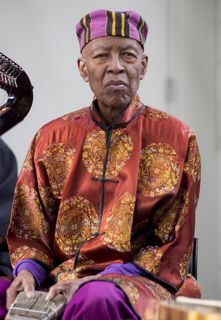While Hypnotic Brass Ensemble, comprising eight sons of jazz-beyond-jazz seer Kelan Phil Cohran, was tearing it up in the midst of its Bad Boys of Jazz tour at the Enclave de Agua African American Music Festival in Soria, Spain, the patriarch himself held forth nearer home at the Garfield Conservatory, on the first of four free Neighborhood Nights concerts presented this month by the Jazz Institute of Chicago.
The elder Cohran, an early member of Sun Ra’s Arkestra and original co-founder
 (though soon ex-member) of the 49-year-old Association for the Advancement of Creative Musicians (AACM), announced “I am 87 today — I mean, I was 87 yesterday, too.” He recited late-19th century dialect poems by Paul Lawrence Dunbar, aptly identifiying them as proto-rap. He played harp, a note or two on trumpet and several solos on electric kalimba, the instrument he concocted and calls the frankiphone, popularized by his one-time sideman Maurice White on classic tunes by Earth, Wind and Fire.
Cohran was supported throughout his modal vamps and a rudimentary version of Ellington’s “C-Jam Blues” by his sons Tycho and Malik on tuba and Korg X50 electric keyboard, singer Phanta Celah and singer/dancer Afrika Brown (daughter of the late, great Oscar Brown Jr.).  The music had a homemade, self-taught vibe, demonstrating higher aspirations than aesthetic realization. But in this case, Cohran’s messages were more important than their aesthetics.  He spoke of enormous cultural shifts he’s observed since growing up in the 1930s, saying his aim is always to offer audiences “quality,” and speculated that “since the weather has gotten so extreme, maybe we’ll become more serious about music again.” As everyone who performs in Chicago now ought to, he made a point of dismay over the city’s deadly gun problem, acknowledging that there’s been no effective answer to the culture of violence, and offered lyrics that asserted  “got to get myself away from here” and “gotta get myself back on track.”
The huge greenhouse dating from 1884 in which the concert was set was a bubble of calm within the relative wilds of Garfield Park on Chicago’s still-desolate West Side. A friend described the surrounding streets as “rowdy,” a way of warning, “Don’t go there.” The night before, a young teenage boy was murdered and six other people wounded during a gang-related drive-by shooting. At 8:45 pm, about an hour after the performance ended, a man talking to a girl at a gas station on the far edge of the park was shot during an attempted robbery. The Chicago Sun-Times “Shooting Tracker” noted 13 incidents between 6 pm Friday 7/25 and 4 am Sunday 7/27. Of course that’s a huge improvement over the 11 dead, 60 wounded over the July 4 weekend three weeks ago. It’s not like nobody’s trying to address the issues. Over that recent national holiday, Police Supt. Garry McCarthy assigned hundreds of extra officers to patrol the city. It might have been worse without them.
After Phil Cohran’s concert mi corazon and I ate supper with three of my closest, oldest friends and multi-reedist/AACM stalwart/University of Chicago improvisational music instructor Mwata Bowden. We went one block from the Conservatory, to Inspiration Kitchens, a community service-non-profit that trains homeless people in food-industry skills, offering tuition subsidies, job placement, “retention skills” and employing them (also at a café in the Uptown neighborhood). Among us we sampled corn bisque, fresh green bean salad, shrimp over cheese grits, crab cakes, buttermilk fried Cornish hen and a house-special dessert of deep chocolate flourless cake over carmel sauce with brittle and a scoop of ice-cream. Highly civilized environs and delicious fare amidst a site of repeated tragedies. Solutions exist, but don’t come easy. Complications persist.
howardmandel.com
Subscribe by Email |
Subscribe by RSS |
Follow on Twitter
[contextly_auto_sidebar id=”pt4RBohjt4T627V8Jl3nY8qIBbtbFCBT”]

